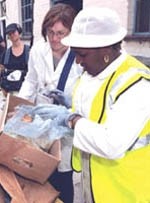FSA investigates ‘smokie’ meat production

The Food Standards Agency (FSA) has been asked to look into legalising the manufacture of ‘smokies’ under controlled hygienic conditions to meet the large demand that exists for these products among some ethnic communities within the UK.
Smokies are a type of ‘bush meat’ comprising goat and sheep meat with the skin on that is blowtorched to impart a distinctive golden brown colour and a smoky odour, often in unhygienic conditions in the outbuildings of isolated farms. Under the Fresh Meat (Hygiene and Inspection) Regulations 1995, its production is illegal. It is also illegal to import it into the European Union from third countries.
At a meeting last week of the FSA’s Meat Hygiene Policy Forum (MHPF) - a body comprising various stakeholders in the meat processing sector - it was agreed to investigate the feasibility of manufacturing smokies under hygienically controlled conditions. This could resolve the widespread problem of their illegal import and production.
Smokies are considered a delicacy by many people from parts of Africa who now live in the UK. There have been a number of seizures of these illegal products, both within travellers’ luggage and on farms in the UK where they are produced. “There is a huge demand [for smokies] in major conurbations,” said Peter Scott, director of the British Meat Processors Association, who attended the meeting. “If it can be made legally, then the demand for it is there.”
Criminal gangs are known to be involved in the illegal trade and there are concerns that they may be transforming diseased and decomposing meat for human consumption. There are also concerns that such meat might also be contaminated with specified risk material, which in licensed business is always removed as a protection for consumers against new variant Creutzfeldt-Jakob Disease - the human form of BSE.
In a separate move, the MHPF meeting last week recommended that the regulatory burden on small abattoirs should be reduced. The MHPF’s proposals, governing areas such as facilities for detained meat and for cleaning livestock transport on site, will go before an FSA Board meeting on March 9. “The MHPF is looking to change legislation to make life easier for small abattoirs,” said Scott.
Scott also reported that the approval procedures for meat processing plants under the new hygiene rules that came into effect earlier this year “seems to be going okay”. So far, he said, nobody had failed to be re-approved, although he added: “I'm sure some plants will fail to meet the new standards.”
Scott noted that eight abattoir and cutting plants had closed down since the start of the year. However, these closures may have been due to the adverse economic climate in the sector rather than any inability to meet new hygiene standards. Some small cutting plants and abattoirs, including some run by farmer co-operatives, were also known to have opened, although the number is not known.











